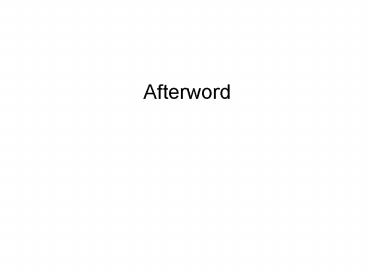Afterword PowerPoint PPT Presentation
1 / 22
Title: Afterword
1
Afterword
2
The people of America have done a remarkable job
in responding to Hurricane Katrina.Charitable
giving to three hurricanes (Katrina, Rita and
Wilma) topped 2 billion.(p.203)
3
Because charity is episodic, what is needed
are structures of justice that perpetuate the
goodwill intended in charity. (p.203)
4
As Martin Luther King, Jr. warned us, compassion
for the victim along the Jericho road is never
enough we must transform the Jericho
road.(p.203)How does the question, Who is my
neighbor? and the bible parable of the good
Samaritan in Luke 1030-35 relate to
Katrina?When and why did Dr. King use the
metaphor of the good Samaritan on the Jericho
road?
5
FEMA must be fixed. It should be upgraded to a
cabinet-level position to ensure greater
attention from the president. (p.204)Shouldnt
our concern about potential terrorist disasters
and future natural disasters move us to be better
prepared to respond than FEMA was?
6
FEMA must combat internal forces that view our
collective federal emergency response as an
oversized entitlement program.(p.204)
7
FEMA must bring in capable professionals to head
the various divisions within the agency.(p.204)
8
Local, state, and federal governments must
outline effective plans to evacuate the poor and
most besieged communities.Anticipating the needs
of the poor who lack cars should spur the
government to use municipal transportations to
speed evacuation.(p.204)
9
The reconstruction process must include the
voices and visions of the black folk who are, at
67.9 percent the majority in New Orleans.(p.204)
10
The Latino, Native American, and Asian
populations that supply vital labor in service
industries must also be included in rebuilding
efforts.(p.205)
11
The federal government must preserve coastal
wetlands and barrier islands to beat back the
violent winds of hurricanes.(p.206)
12
The governments should also set up a Katrina
victims fund like it did for the victims of
9/11. Tragically, the victims of 8/29 are widely
seen as undeserving of the respect and cultural
empathy that go to the victims of
9/11.(p.207)What is the difference between
awarding monies to the families of the victims of
9/11 and awarding similar funds to the families
of the victims of Katrina of 8/29?
13
Society has a role to play as well. We must
foster a national conversation on race, poverty,
and class.(p.208)How can these discussions
about the specifics of our handling of Katrina
become a model for how to conduct such
conversations?
14
We have a huge job of educating ourselves in the
general public about the true nature of poverty.
(p.208)What if we do not?
15
Ifgovernmental assistance is self-help because
the people own the government, there is no shame
or harm in encouraging the government to do its
best to uplift and rescue its citizenry from the
weariest social margins. (p.209)What does this
say about how citizens should influence the
government?
16
The media, too, is critical in facilitating this
conversationthe media regained a bit of its
necessary skepticism about the government while
covering Katrinait squandered its capital on
unverified reportsthat played tostereotypes.(p.2
09)
17
Black communitiesmust confront the often bitter
bias against the poor that grows in our
ownyards. (p.211)
18
Black fraternities, sororities, civil rights
groups, and voluntary organizations must pool
resources and direct attention to the plight of
the poor.(p.211)How do social capital networks
of connections reproduce and repeat class
inequalities?How might developing their own
social capital resources benefit the poor?
19
Finally, we must engage in memory warfare. We
must confess that Katrina not only revealed the
callous disregard for povertys colored face to
the nation, but also exposed our failure to
mother and father our race into its best
future(p.212)
20
We must never let the nation forget what was
learned from KatrinaMemory warfare pits us
against the forces of cultural, racial, and class
amnesia.So what has the nation learned from
Katrina?
21
We must embrace the sometimes painful but
ultimately healing remembrance that makes us
human and wise.(p.212)
22
End of Summary of the Afterword ofCome Hell or
High Water Hurricane Katrina and the Color of
Disaster by Michael Eric Dyson

